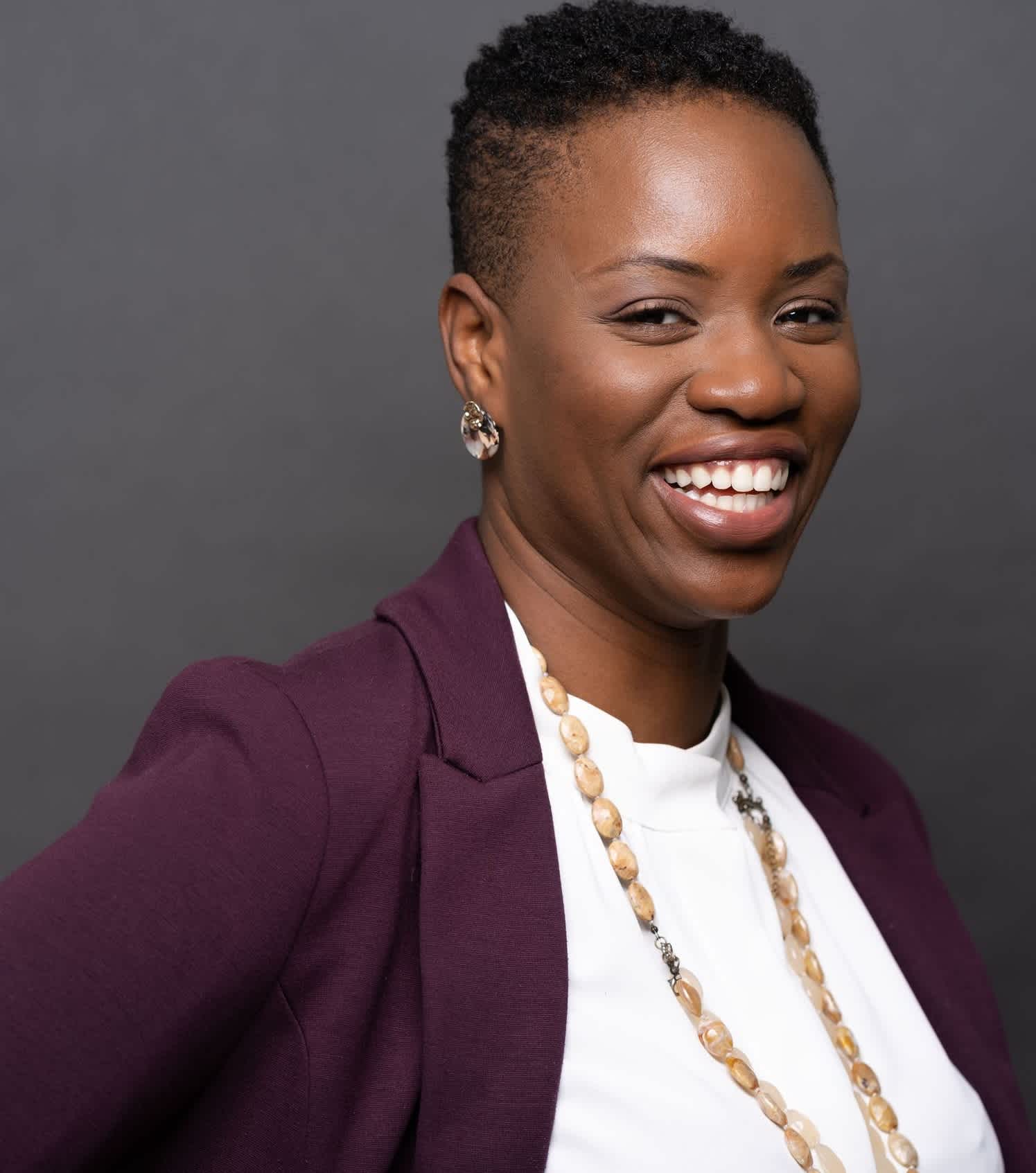AAPI Heritage Month Spotlight: Dan Leung — Serial Entrepreneur
Asian American entrepreneur Dan Leung talks about his three businesses — Five Five Collective, Jam Good Toast, and Roof Deck Media — and gives advice for AAPIs.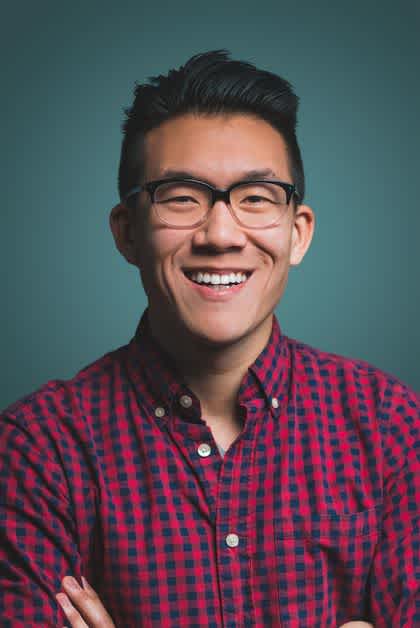
As co-founder and owner of three businesses in Philadelphia, Asian American Dan Leung is a serial entrepreneur. In 2014, he started production company Five Five Collective with partner Max Goldberg. During the pandemic, Leung formed two more companies — Roof Deck Media, a real estate photography and virtual tour company, and Jam Good Toast, a merchandise company centered around bread.
Today, we talk with Dan about starting a business while in college, building business relationships, and baking bread for fun and profit.
Let’s talk about Five Five Collective. What is your business, and how did you get started?
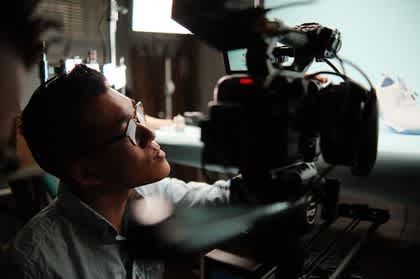
Five Five Collective is a full-service video production company based in Philadelphia. We serve companies, brands, and universities, and we make marketing videos for all those. We started in 2014 — “we” being my partner Max Goldberg and me.
We were Drexel film students, class of 2014. For our senior year, we decided to create a film company to get a head start on making videos for other people, rather than creating a senior thesis that a lot of our classmates were doing. That year served as a pretty good test drive to make videos for other people, learn how to talk to clients, and create a portfolio. We met some great people along the way, and that really kickstarted our full-time business in 2014.
How have you expanded since that test drive year? How did that foundation help you?
We met a lot of people in college — people going into the healthcare industry, or home remodeling, or higher education. All those people were doing video in those industries, and when those respective companies needed some external help in video, I was the first person they called.
Because I fostered relationships in college and continued to work on them post-college, some of our first clients were higher education, healthcare, and home remodeling companies. It was a huge help to have clients right out of the gate, and the relationships I formed in college were a big part of that.
What are some challenges that you faced in running your business?
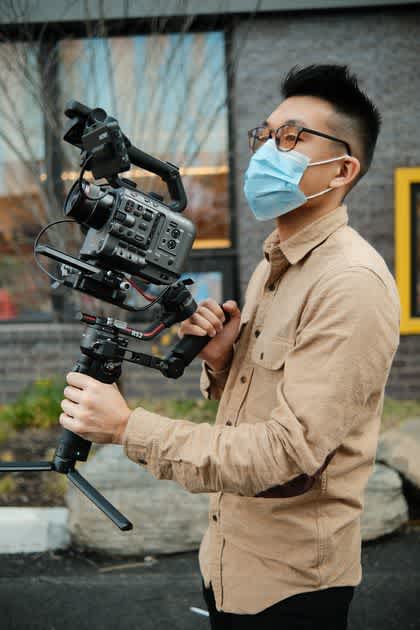
A big challenge as a small business owner is that you wear a lot of hats. I wear a lot of hats, and my partner wears a lot of hats. But they’re different hats, and having so many responsibilities is hard to juggle.
I felt like I was stretched pretty thin for many years until I found areas I wanted to focus on, areas my partner wanted to focus on, and areas where we could bring on freelancers to fill in those gaps. So a big challenge was wearing many hats, and a way that I figured that would be helpful is to fill those gaps with freelancers — editors, cinematographers, photographers — so I could continue running my business while they’re being really good at their craft.
And we overcame some of those challenges quite recently. In 2020, we hired our first full-time producer. So that helped with relieving some of the producer duties that my partner and I shared since 2014.
So what are some of your biggest wins in the past few years?
A really big win for us is honing in on what type of work we want to create for clients. That might mean honing in on an industry — we have a few that we like to work with, like higher education, healthcare, and commercial brands. But we like telling stories with our video projects. We probably won't do it if it’s not telling a story.
So one of the biggest wins is just knowing what we want to do as a business. That drives us and directs us to turn down some projects that aren’t a good fit for us and don’t serve our values.
Another big win is moving into an office that better suits our needs. We went through three offices so far, and we’re still looking at new spaces, but finding new physical spaces that work for us really drives our creativity and helps us be more productive.
You mentioned how you like to tell stories at Five Five Collective. What are some stories that you’ve told with your videos that really resonated with you?
We often work with higher education, telling stories of current or past students, why that higher education institute is a good place for them, a good place for potential students, and why they feel like they belong. It’s great to hear that from these people, and I get a sense of, like, “I could be a part of that place too. I want to be part of a place where I feel like I belong, where I feel like I’m included.”
And it really shows through these people’s stories. At its core, it’s a recruitment/admissions type of video, but if it’s working on me and I’m behind the camera, I think it might work for the people watching our videos.
What does it take to run a successful production company?
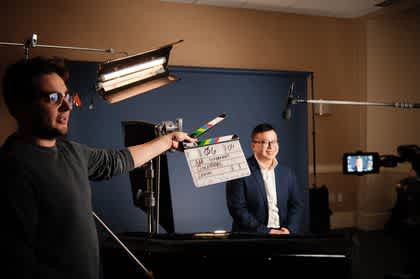
I think running a successful production company is twofold.
One approach would be to solve the client’s problems with video. That could be as simple as an admission video or recruitment video. They need more people; we can do that with video. Or to sell more products, we can show that product in a really good light, both figuratively and literally.
Two — it’s to create a platform where talented creatives can really shine and feel valued and be creative. As a production company, we do a lot of hiring for projects. So that’s bringing on freelancers who are good at one thing and giving them an opportunity to show off, to be really good at their craft, and to work with an outstanding team. I think that’s part of our responsibility — to be a place where we can have that platform for people to do that.
I was doing a lot of the camera work when we were starting out, so we brought in some assistant camera and video editor help. But now, I think I’m moving more toward an executive producer role. I’m hiring cinematographers and directors of photography, the job I used to have.
But now, I can hire people who specialize in that and watch them do great work. So creating a platform for people to shine is, I think, what makes a creative and successful production company.
And what inspired you to start your next business?
So the pandemic and being at home a lot inspired me to create a second business, Jam Good Toast, centered around bread. A lot of people were baking bread at home, and I did the same. I made sourdough, bagels, and very poor baguettes, but it was a lot of fun! I ate a lot of carbs.
People turned into home bakers and were proud of making things at home. So I partnered with my graphic designer friend, and we created a merchandise company centered around bread and bread lovers. I thought it was really fun, and I saw that it was pretty easy to do based on YouTube videos.
What is it like juggling multiple business interests?
Honestly, juggling a lot of businesses is pretty difficult at times. The mind of an entrepreneur is constantly racing, and I had to learn to create some boundaries.
Personally, that meant trying to have “business hours” that people are used to working within, like a 9 to 5. But for me, it’s more like a 10 to 6. And then having a second business means that I work on that business after my primary business, so that would be from like 6 to 10.
Finding time to work on another business or carving out some time during the normal workday takes a lot of intention. I think it’s fulfilling ultimately, but also pretty challenging and a lot of work mentally.
What’s the most exciting thing about running your own business?
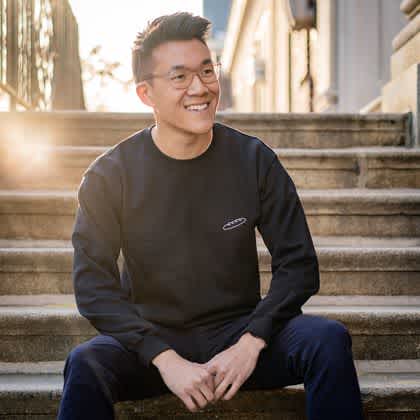
Freedom. For me, the biggest freedom point is time, how I can use my time however I want. I choose to work from 10 to 6, but nobody tells me to work from 10 to 6. Nobody tells me to come into the office at 8 am and stay until 7 pm.
All of that is my decision, and if I choose to work longer, that’s on me. But it also gives me the freedom to take some days off in the middle of the week, like if I want to meet someone for lunch, or go to a graduation, or go on vacation to leave the city.
Having the freedom to use my time how I want is one of the best things about running a business, but also another exciting thing is that I can see the fruit of my labor. People pay me to create things I’m passionate about. So, whether that’s making a video or having a love for bread, it’s nice to know that people are supporting something that I enjoy doing.
Both of your businesses are partnerships with other co-founders. Can you talk a little bit about what that working relationship looks like?
Yeah, I think having a partnership in a business is a real privilege. Running this race with someone else is more gratifying, and it’s great to have another mind in the room. I can only get so far on my own, and having complementary skill sets — having someone who is solid in an area where I’m not — is fantastic.
I can make better decisions if I have a second opinion. If I make a decision and it doesn’t work out, that’s a lot of weight to have on a single pair of shoulders, but if it was made as a team, I think it’s a lot less weight. It’s a learning opportunity where two people can learn rather than just one.
So I’m grateful for having partners in my businesses. I wouldn’t want to do business without a partner.
How has the Covid-19 pandemic affected your businesses?
For my main business, Five Five Collective, the video production company, we often film people in person. The pandemic put in-person interactions on pause for quite some time, so that wasn’t happening.
So we honed in on another area that we excelled at — animation. We could do that on a computer remotely. We got pretty good at recording Zoom interviews and cutting those up into something usable.
But yeah, we didn’t have a lot of in-person activities for quite some time, not until the fall of 2020. So we pivoted. We found ways to serve our clients, to solve the problems with video. When everyone was doing things virtually, we found ways to do video virtually. It was a challenge, but we found ways to overcome it.
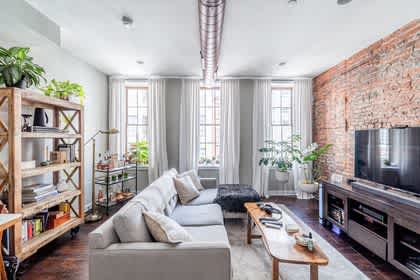
During the pandemic, we also created another business, a real estate photography and virtual tour company called Roof Deck Media. A few of our real estate development clients in Philadelphia wanted photography and virtual tours of their apartments. I went into these vacant apartments with a 360 camera and created virtual clones of those spaces that apartment seekers could view on their computers and phones.
We learned how to use our current equipment in new ways and serve new clients. So, we created a new business during the pandemic!
Any advice for other AAPIs that want to start a business?
My advice for other AAPIs who want to start businesses is to seek out those who’ve already done something that you want to do — people in your industry that are either doing it or have done it.
I met some people in the film industry who are of Asian descent who I became friends with. Originally, I reached out asking, “Hey, can you tell me a little bit more about your experience as an Asian-American in film? How are you getting clients? How do you do this type of video? How do you edit this type of video?”
These mentors have been essential in my journey as an Asian American business owner in the film industry. So my advice is to ask other people if you see that they’re doing what you want to do and see if they can share some advice.
So, it’s really about finding community?
Yeah, I think it’s about finding community, people who can give you advice, and people who want to support and encourage the next generation. I found my community through some friends from college who knew another friend, then getting to know them and becoming their friend myself. It’s great.
Who are some other AAPI business people you admire?
My friend Kris Mendoza runs another video production company in Philadelphia. I met him in maybe 2015, and he gave me a lot of great advice on how to start and run a video production company.
Whether or not we have similar clients, we’re not really competing. There’s plenty of work out there to go around, and we’re all here to support one another and to have thriving successful small businesses. So he’s been a great help for me, and I think a lot of other Asian Americans — and every other person as well — in getting into the film industry and working in video production.
What are your goals for Five Five Collective in the next five years?
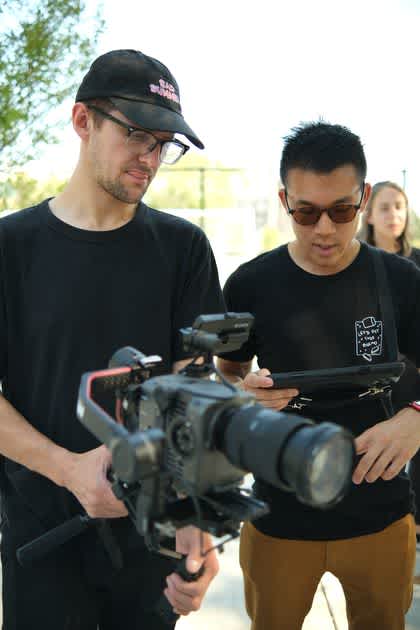
One goal for Five Five Collective is to continually grow our network of creatives and meet new people in the area. And around the world, if we have the opportunity to work outside of this Greater Philadelphia area. We also want to make a nationally televised ad. I don’t know if TV is still “in” anymore, but something streaming that many people will see.
Another goal is to bring on at least five full-time employees to fill some roles that we might need. I want to continue creating an environment where my team feels valued for their talents, fulfilled in their work, and celebrated for who they are. So hopefully, as my team grows, I can continue to create a space where they have a fulfilling time at work.
Do you have any advice for creatives who are looking to start their own business?
There are a ton of resources out there for creatives to start their own business. You can find information on Instagram, Tik-Tok, and YouTube on how to be better at a craft as a creative and how to build a business.
There have been so many nuggets of knowledge in podcasts that help me feel like I’m doing the right thing in being an entrepreneur, and I feel encouraged that I made a good decision running my own business.
Do you see yourself as a creative first, or an entrepreneur first?
Before I started this business, Five Five Collective, I definitely saw myself as a creative doing photography and cinematography — someone who likes to create media out of few things or a lot of things. But further into this journey as the business owner of Five Five Collective, I found that I’ve taken on this hat of “business owner” and “entrepreneur,” and I wear it proudly. I feel like somebody has to be entrepreneurial and business-minded to grow a business.
I found a lot of experience as an entrepreneur and a business owner by just doing things. It may not be the best way, but I learned a few things I’m sure business school could have primed me on. I do wish that I maybe took some business courses earlier on, but I think the hands-on experience is also quite valuable.
I am both a creative and an entrepreneur. I’m proud to be those things, and I’ve embraced the business side. I’m sure a lot of other people can find a lot of fulfillment in running a business while also staying a creative.
Follow Dan on His Journey
You can follow Five Five Collective on Instagram at https://www.instagram.com/fivefivecollective/. Roof Deck Media can be found at https://www.instagram.com/roofdeckmedia/, and don’t forget to follow Jam Good Toast at https://www.instagram.com/jamgoodtoast/.
Swyft Blog
Everything you need to know about starting your business.
Each and every one of our customers is assigned a personal Business Specialist. You have their direct phone number and email. Have questions? Just call your personal Business Specialist. No need to wait in a pool of phone calls.
